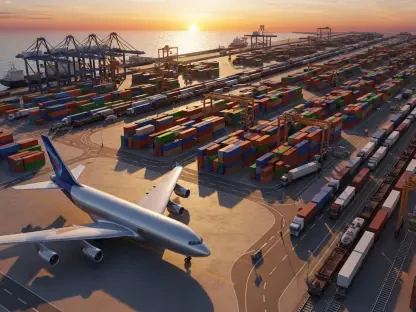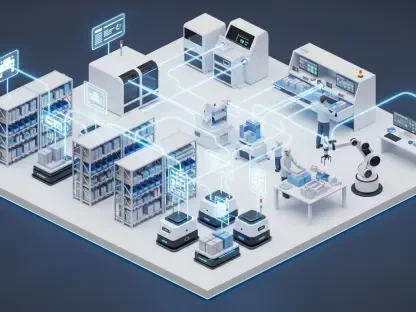In the ever-evolving landscape of global logistics, the advent of digital technology has transformed the supply chains responsible for delivering fresh produce. Traditional methods of transport and communication often faced numerous challenges, such as port congestion, labor strikes, and schedule disruptions, which severely affected the timeliness and quality of perishable goods. However, innovative solutions pioneered by companies like Dockflow are making significant strides in addressing these issues and enhancing the efficiency and reliability of supply chains.
The Importance of Visibility and Data Integration
During the Logistics Hub session on the final day of Fruit Logistica, Michiel Valee, co-founder of Dockflow, emphasized the significance of digital innovation in improving connectivity within supply chains. Dockflow’s logistics enablement suite specifically targets the common pitfalls in the industry, providing container visibility for ocean-going shipments and minimizing delays. Collecting and consolidating data from carriers, shipping lines, and satellite systems, Dockflow’s platform offers a comprehensive dashboard view of thousands of containers in real-time. This capability ensures stakeholders remain informed and can make proactive decisions to mitigate issues like demurrage costs and booking errors.
The necessity for accurate and efficient data processing cannot be overstated. Data collected by Dockflow is pivotal in maintaining the overall health of logistical operations, which, in turn, helps preserve the freshness of produce. By combining shipping data with metrics assessing fresh produce quality, Dockflow, in collaboration with Neolithics and the World Economic Forum, is pushing the envelope further. This fusion of logistics and quality metrics leads to timely delivery, reduced claims, and enhanced resilience against disruptions. Valee’s insight on the pitfalls of developing proprietary logistics software underscores the importance of relying on established platforms that evolve with technological advancements.
Reshaping the Future of Logistics with Foundational Data
Foundational data serves as the bedrock for incorporating advanced solutions like artificial intelligence in the logistics sector. Basic visibility data, as provided by Dockflow’s platform, is essential for supporting future developments aimed at further streamlining operations. By offering a holistic view of logistical scenarios, such data allows for preemptive action to safeguard and improve the supply chain’s efficiency. The evolution of these systems promises to revolutionize the logistics landscape, enhancing transparency and reliability.
The partnership between Dockflow and other industry leaders marks a substantial improvement in integrating quality metrics with logistical data. This collaboration underscores the importance of a multidisciplinary approach in tackling various aspects of supply chain management. The robust systems being developed stand to facilitate more precise and agile responses to the unpredictable challenges that frequently plague the industry. The seamless incorporation of complex datasets and their interpretation paves the way for a future where logistics are less about reacting to disruptions and more about preventing them proactively.
Ensuring Optimal Condition of Fresh Produce
Responding to consumer demands for fresher produce remains a core objective in the logistics and supply chain sector. The innovative suite offered by Dockflow helps ensure that fresh produce remains in optimal condition throughout its journey from farm to table. Enhanced tracking capabilities and improved stakeholder visibility mean that delays and errors in the booking process are minimized, leading to fewer claims and superior delivery reliability. The platform’s data-driven approach not only cuts down on operational inefficiencies but also significantly elevates the standard for fresh produce transport.
Continuous improvement in logistics technology heralds a new era for the supply chain industry. The actionable data provided creates opportunities for integrating AI and other sophisticated tools that can predict and mitigate potential issues before they escalate. This proactive stance ensures that disruptions like port congestion and labor strikes have a reduced impact on the delivery of fresh produce, safeguarding its quality and shelf life upon arrival. Turning insights into action, such technological advancements embody the future of logistics focused not just on maintaining but continually improving standards.
The Path Forward
In the dynamic world of global logistics, the introduction of digital technology has revolutionized the supply chains responsible for delivering fresh produce. Traditional systems of transport and communication often encountered numerous obstacles, such as port congestion, labor strikes, and schedule interruptions, which had severe impacts on the timeliness and quality of perishable goods. These issues often led to significant losses both in product and revenue. Nevertheless, cutting-edge solutions developed by forward-thinking companies like Dockflow are making substantial advances in tackling these problems. By integrating modern technology and innovative approaches, they are improving the efficiency and reliability of supply chains. These advancements include real-time tracking, predictive analytics, and automated logistics, which ensure that fresh produce arrives in optimal condition and on time. As a result, the entire supply chain process is becoming more streamlined, resilient, and capable of meeting the increasing demands of a global market.









